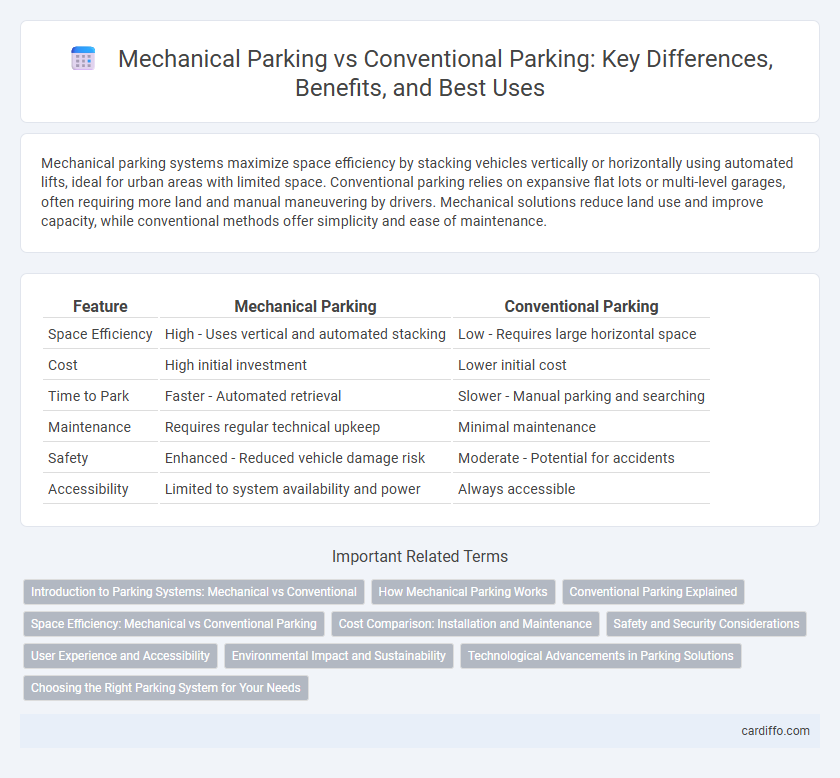Mechanical parking systems maximize space efficiency by stacking vehicles vertically or horizontally using automated lifts, ideal for urban areas with limited space. Conventional parking relies on expansive flat lots or multi-level garages, often requiring more land and manual maneuvering by drivers. Mechanical solutions reduce land use and improve capacity, while conventional methods offer simplicity and ease of maintenance.
Table of Comparison
| Feature | Mechanical Parking | Conventional Parking |
|---|---|---|
| Space Efficiency | High - Uses vertical and automated stacking | Low - Requires large horizontal space |
| Cost | High initial investment | Lower initial cost |
| Time to Park | Faster - Automated retrieval | Slower - Manual parking and searching |
| Maintenance | Requires regular technical upkeep | Minimal maintenance |
| Safety | Enhanced - Reduced vehicle damage risk | Moderate - Potential for accidents |
| Accessibility | Limited to system availability and power | Always accessible |
Introduction to Parking Systems: Mechanical vs Conventional
Mechanical parking systems utilize automated technology to maximize space efficiency by stacking vehicles vertically or rotating them into compact arrangements, ideal for urban areas with limited space. Conventional parking relies on traditional open or structured lot designs, providing direct vehicle access but often requiring more land area. The choice between mechanical and conventional parking depends on factors like space availability, cost, and user convenience.
How Mechanical Parking Works
Mechanical parking systems utilize automated machinery to lift and store vehicles in compact, multi-level structures, significantly increasing parking capacity within limited spaces. These systems often employ hydraulic lifts, conveyors, or rotating platforms controlled by computer software to efficiently position cars without driver intervention. The automation reduces retrieval time and minimizes the space wasted on aisles and ramps compared to conventional parking methods.
Conventional Parking Explained
Conventional parking involves vehicles being parked directly on flat surfaces such as open lots or multi-level garages, allowing easy access and straightforward navigation. This method is typically cost-effective to construct and maintain but requires more land space compared to mechanical parking systems. Conventional parking efficiency depends on layout design, maximizing space utilization while ensuring safety and accessibility for drivers.
Space Efficiency: Mechanical vs Conventional Parking
Mechanical parking systems maximize space efficiency by stacking vehicles vertically or horizontally, enabling up to 60% more cars per square meter compared to conventional parking lots. Conventional parking requires larger surface area and driving lanes, resulting in lower car density and increased land use. Advanced mechanical solutions like automated platforms and lifts optimize urban space usage, reducing the footprint of parking infrastructure significantly.
Cost Comparison: Installation and Maintenance
Mechanical parking systems typically require higher initial installation costs due to advanced technology and equipment, whereas conventional parking involves lower upfront expenses with simpler construction. Maintenance costs for mechanical parking are generally elevated because of regular servicing of automated components and potential repairs, contrasting with conventional parking's relatively minimal upkeep mostly limited to surface repairs and cleaning. Over time, the total cost analysis depends on usage patterns and space efficiency, with mechanical systems potentially offering better long-term value in dense urban areas despite the higher ongoing maintenance expenses.
Safety and Security Considerations
Mechanical parking systems enhance safety by minimizing human error and reducing vehicle damage through automated operations, while conventional parking relies heavily on driver skill and attention. Security in mechanical parking is elevated by controlled access and surveillance integration, limiting unauthorized entry and theft risks compared to open conventional lots. Both systems require proper maintenance, but mechanical solutions offer advanced safety sensors and fail-safes that significantly reduce accidents and enhance overall vehicle protection.
User Experience and Accessibility
Mechanical parking systems streamline user experience by reducing the time and effort needed to find and park a spot, often enabling seamless entry and exit through automated platforms. Conventional parking requires drivers to manually search for spaces and navigate aisles, which can lead to congestion and longer wait times. Accessibility in mechanical parking is enhanced by compact designs that maximize space usage and often include features like designated spots for disabled users, while conventional lots may face limitations in accommodating diverse vehicle sizes and mobility needs.
Environmental Impact and Sustainability
Mechanical parking systems significantly reduce land use and vehicle emissions by optimizing space through automated stacking and retrieval, minimizing the need for large surface parking lots. Conventional parking lots contribute to urban heat islands and stormwater runoff pollution due to extensive impervious surfaces and limited green infrastructure. Implementing mechanical parking enhances sustainability by lowering carbon footprints, preserving green spaces, and supporting eco-friendly urban development.
Technological Advancements in Parking Solutions
Mechanical parking systems leverage advanced automation technologies such as robotic lifts, automated stacking, and smart sensors to maximize space efficiency and reduce human intervention. Conventional parking relies primarily on manual parking of vehicles in designated spaces, which often leads to suboptimal space utilization and longer search times. Technological advancements in mechanical parking include AI-driven vehicle retrieval, real-time occupancy tracking, and integration with mobile apps, significantly enhancing user convenience and operational efficiency.
Choosing the Right Parking System for Your Needs
Mechanical parking systems offer space-efficient solutions by utilizing automated lifts and rotating platforms, ideal for urban areas with limited space. Conventional parking provides simplicity and lower installation costs, making it suitable for locations with ample land and less demand for optimization. Evaluating factors such as available space, budget, vehicle volume, and operational speed helps determine the most effective parking system for your specific needs.
Mechanical Parking vs Conventional Parking Infographic

 cardiffo.com
cardiffo.com